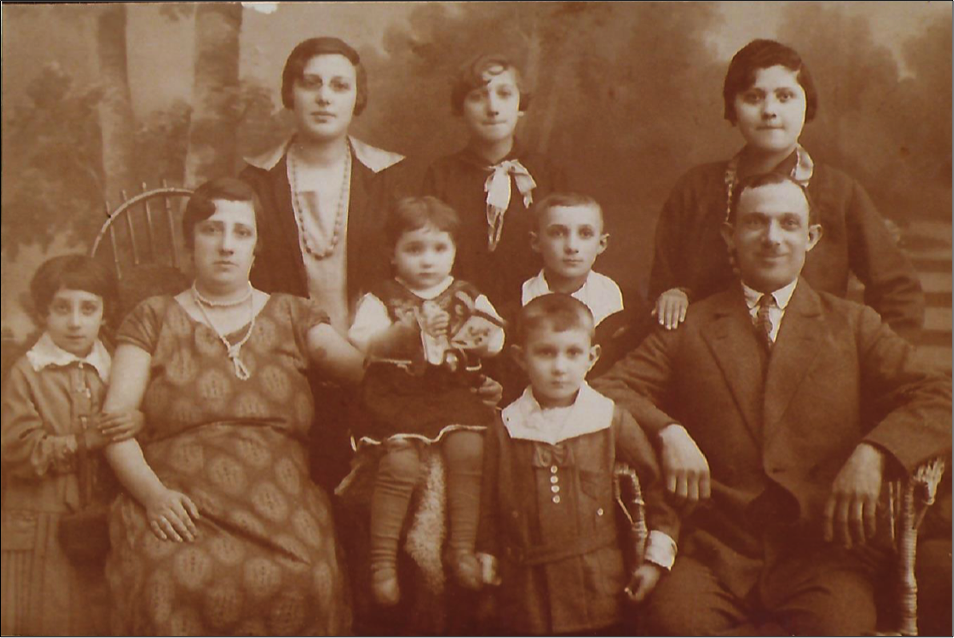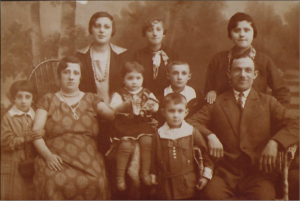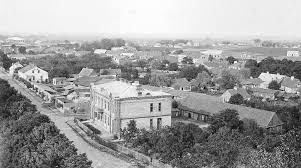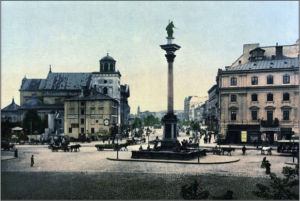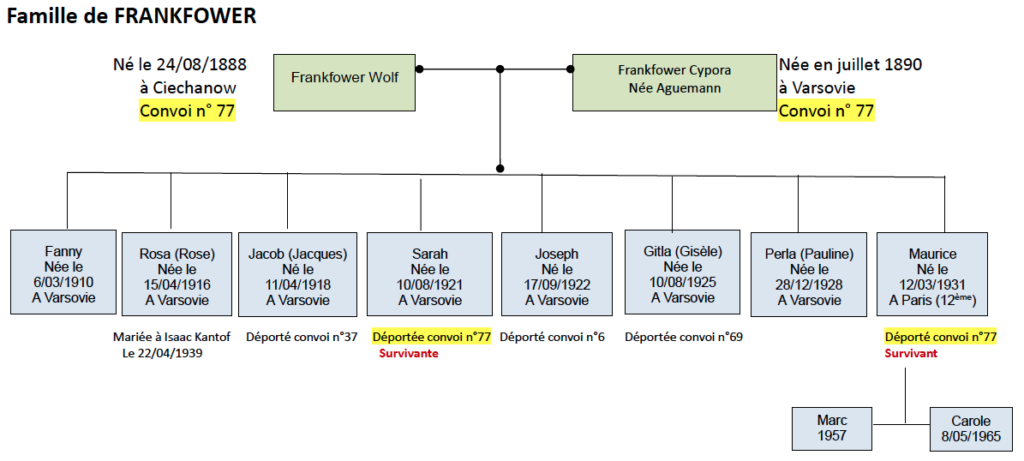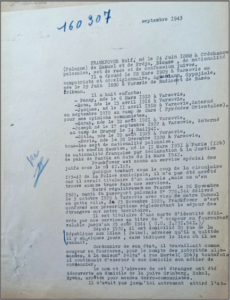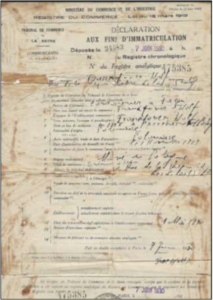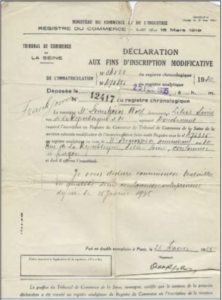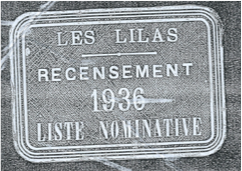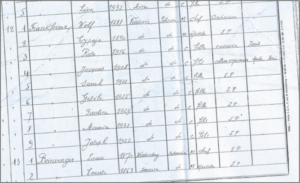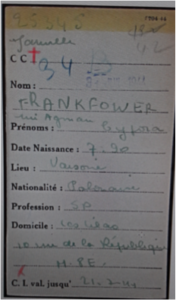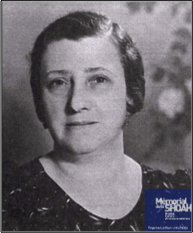Sarah FRANKFOWER
This biography was researched and written by the 9th grade students of the “Badinter” class at the Marais de Villiers middle school in Montreuil-sous-Bois, in the Seine-Saint-Denis department of France, with the guidance of their history and geography teacher, Claire Bertrand.
We initially began the project during the 2019-20 school year, but the COVID-19 epidemic stopped us in our tracks. At that time, we had very few resources available to us. During the 2022-23 school year, therefore, the project was relaunched, with the aim of gathering together additional records and searching for any possible descendants. Having written a Facebook message to everyone we could find with the name Frankfower in June 2022, Carole, the daughter of one of the survivors, contacted us in August that year. With the extra records and Carole’s help, our task became easier, although there still remain a few unresolved issues.
We are delighted to be able to share our work with you here.
A family of Polish descent
Fanny – Rosa – Sarah
Gitla – Gypojiale (the mother) – Perla – Jacob – Wolf (the father)
Joseph
Source: Family photo kindly provided by Carole Frankfower, Wolf and Gypojiale’s granddaughter
Taken in around 1930-1931
Sarah’s parents were both born in Poland, as were her siblings. She was the fourth of eight children.
Her father, Wolf Frankfower was born on June 24, 1888 in Ciechanow (also spelled Créchanow on some records), a small town of around 5,000 people some 50 miles north of Warsaw. His parents were Samuel and Freja Bicaze, both of whom were Polish citizens and Jewish.
The town of Ciechanow in around 1910
Source
Her father met Gypojiale Aguemann, who was born in Warsaw on June 28, 1890. Her parents were Radine and Bassa Crikman. Wolf and Gypojiale (again, the spelling varies) were married on March 28, 1909, also in Warsaw.
Warsaw in around 1900
Source: vanupied.com
The couple had eight children, seven of whom were born in Warsaw: Fanny, on March 6, 1910; Rosa, on April 15, 1916; Jacob (Jacques), on April 11, 1918; Sarah, on August 10, 1921; Joseph, on September 17, 1922; Gitla (Gisèle), on August 10, 1925; and Perla (Pauline, Paulette) on December 28, 1928.
Their last child, Maurice was born in the 12th district of Paris on March 11, 1931.
The move to France
Her father, Wolf Frankfower moved to France on November 26, 1929. He arrived legally, having been granted a visa. We are not sure whether the rest of the family arrived at the same time as the father, and nor do we know what prompted the Frankfowers to leave their homeland. We wonder if they were victims of pogroms, or living in poverty.
Source: French National Archives, Pierrefitte.
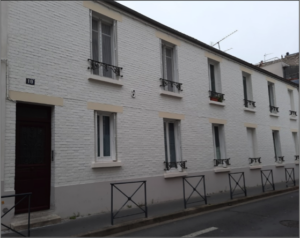
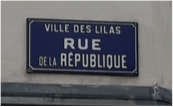
Photograph taken in December 2022 by Claire Bertrand
Sarah’s family set up home at 10 rue de la république in Les Lilas, a working-class neighborhood of single-story brick houses. They were designed by the architect Emile Cacheux, a French public housing specialist. The houses he designed were built in the 1870s.
Her father became a shoemaker. He registered on May 1, 1930 and the Commercial Court officially declared him as such on June 7, 1930. A second declaration, made in February 1935, confirmed that he was an independent shoemaker.
Source: Carole Frankfower’s personal records
From the 1936 census of Les Lilas, we discovered that Sarah and her family (apart from the eldest child, Fanny) lived at this address until they were arrested. According to the census, Sarah was not working at the time.
Les Lilas municipal archives
Arrests and deportation
Between 1940 and 1944, despite being fairly well “protected’, the family came under threat from the French government’s anti-Semitic policies and due to their political activities. First of all, in September 1939, Jacques (Jacob) was arrested for his militant Communist activities, which were deemed dangerous. He was then interned in the Vernet camp in the Pyrenees from October 1939 through September 1942, prior to being deported on Convoy 37 to Auschwitz, where he died.
Joseph was the next to be arrested. On May 14, 1941, he was arrested during the “green ticket roundup”, which targeted foreign Jewish men. He was interned at Pithiviers, then transferred to Drancy camp, from where he was deported on Convoy 6 on July 17, 1942. He too died in Auschwitz.
Next came Gitla (or Gisèle), an apprentice leatherworker, who was arrested and interned in Drancy on February 19, 1944 until March 7, when she was deported on convoy 69. She never returned home.
The Frankfower family was gradually decimated by the Vichy government’s anti-Semitic policies. Four more members of the family were arrested in July 1944, just as the Allies were liberating northern France following the Normandy landings. Wolf, Gypojiale (Cypora) and two of their children, Sarah and Maurice, the youngest child, were rounded up.
Wolf must have hoped that the work permit issued by the German authorities, which was due to expire on August 24, 1944, would help protect his family. However, despite holding the permit, Wolf, his wife and their daughter Sarah were arrested at their home in Les Lilas on July 21, 1944 and taken to Drancy. Sarah’s younger brother, Maurice, was not at home at the time, but was later arrested during a roundup in rue des Rosiers in Paris.
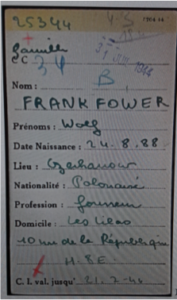
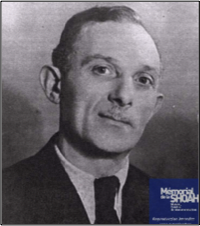
Source: Shoah Memorial, Paris
According to the Drancy registration records, the family members were all assigned to the same staircase and room number (3.4), but later then moved and split up. Sarah and Cypora appear to have stayed together in building 4.2, while Maurice and his father appear to have been separated and put in buildings 6.4 and 4.3 respectively. Ten days later, all four were deported on the last transport from Drancy, Convoy 77, which left for Auschwitz-Birkenau on July 31, 1944.
Life in the camp and the Liberation
Convoy 77, the last large transport from Drancy, was made up of 1310 people, including Sarah and three members of her family. They were herded into cattle cars like animals, in which they spent three days and three nights on the journey to Auschwitz
Sarah and Maurice were separated during their time in the death camps, but both survived. We have no way of knowing whether they had any contact with each other in that hellish place.
The return to France
Sarah and her brother were two of the people who survived after they were deported on Convoy 77.
Unfortunately, for now, we have been unable to find out anything about Sarah’s life after she returned from the camps. Despite having contacted the Mairie des Lilas, the town to which she moved back, we have been unable to trace any descendants. We do know, however, that Sarah married a man called Georges Leprince, and died on November 22, 2006.
Carole, Sarah’s niece, was also unable to give us any further information about her.
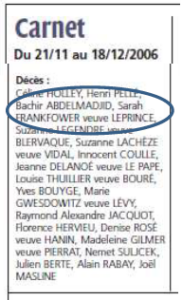
Source : journal mensuel Infos Lilas


 Français
Français Polski
Polski